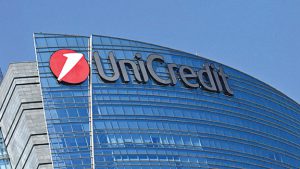Bloomberg
UniCredit SpA signaled a hit of about 200 basis points to its capital buffers in an “extreme scenario†in which its Russian banking assets are wiped out, joining European lenders detailing the potential fallout from the financial turmoil after the Ukraine invasion.
The Milan-based bank doesn’t consider an extreme scenario — the entirety of its exposure to the country is no longer recoverable— as its base case and confirmed that it will pay its planned dividend on 2021 earnings. The lender said it’s closely monitoring developments within the country, while stopping short of Italian rival Intesa Sanpaolo SpA and insurer Assicurazioni Generali SpA in reviewing or exiting its business in the country.
The disclosure is “a positive development adding clarity to a stock now trading at distressed levels and remain buyers,†Alberto Cordara, an analyst at Bank of America Corp., said in a research note.
UniCredit climbed as much as 7.9% in early Milan trading and was up 7.7% to 9.72 euros as of 9:09 am. The bank joined a rally of European banks with the STOXX Europe 600 Banks index up about 5%.
UniCredit is among European banks with the biggest exposures to Russia, along with Austria’s Raiffeisen Bank International AG and France’s Societe Generale SA. It offers banking services to corporate and individual clients in the country through 4,000 employees and 70 branches. Loans to customers of UniCredit’s Russian unit amounted to 7.8 billion euros at end December, while cross border exposure to Russian customers is about 4.5 billion euros.
That involvement has made the Italian lender one of the worst performers among European bank stocks over the past month.
BNP Paribas SA on Wednesday detailed about 3 billion euros of gross exposure to Russia and Ukraine and postponed an investor day scheduled for this month. Deutsche Bank AG is likely to face questions about business in the countries at its investor day Thursday.
UniCredit’s comments echo those of Societe Generale, which last week warned of a potential hit of 50 basis points to its capital buffers in an extreme scenario in which it was stripped of property rights to its banking assets in Russia. Both banks said their dividend would remain unaffected in a worst-case scenario and that they have more than enough buffer to absorb the hit. By contrast, Raiffeisen halted its 2021 dividend payment.
European banks are seeking to reassure investors of the muted impact of even an outright nationalization of their assets in Russia after their stocks bore the brunt of the sell off in European equity markets. Many European lenders such as Deutsche Bank AG have been winding down their dealings in Russia over recent years.
Last week, rival Intesa said its operations in Russia are “under strategic review,†as banks in the region struggle with the impact of financial sanctions. Generali, Italy’s largest insurer, said last week that it‘s winding down its Europ Assistance operations in Russia, quitting the board of Ingosstrakh Insurance Co. and closing its Moscow representative office.
At the December unveiling of UniCredit CEO Andrea Orcel’s new strategy for the bank, the lender forecast that Eastern Europe including Russia would have the highest profitability of any of its regions.
 The Gulf Time Newspaper One of the finest business newspapers in the UAE brought to you by our professional writers and editors.
The Gulf Time Newspaper One of the finest business newspapers in the UAE brought to you by our professional writers and editors.
